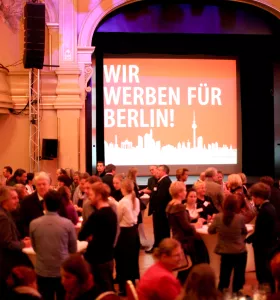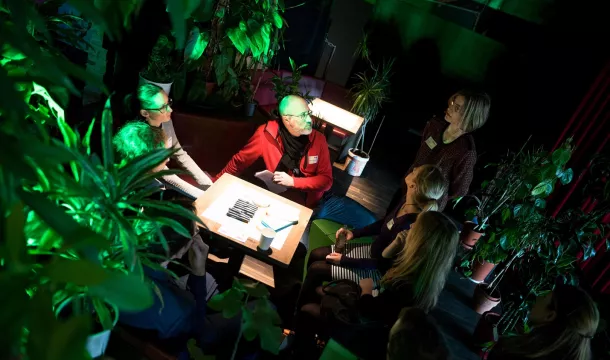Overview of all criteria
The catalogue of criteria for our Sustainable Berlin certification programm, which is approved by the Global Sustainable Tourism Council (GSTC), comprises over 60 criteria from the subject areas of environment, economy, governance, risk & compliance and society.
It is based on recognised national and international frameworks and standards such as ISO standards, the Global Reporting Initiative (GRI), the German Sustainability Code and EMAS (Eco Management and Audit Scheme). The catalogue of criteria was developed against the backdrop of the tourism industry's practice. It covers the ecological aspect of sustainability as well as the social and economic dimension.
To make our certification process as transparent as possible, you can find an overview of all criteria here.
Criteria Governance, Risk and Compliance
Governance
G01.01: Integration of a sustainability strategy - The organisation has a sustainability strategy that is integrated into the corporate strategy. Clear responsibilities are named. Ethical, economic, environmental and social components are included and communicated transparently.
G01.02: Implementation of sustainability goals - The organisation has qualitative and/or quantitative sustainability goals, implements them in a planned manner and monitors the degree of achievement.
G01.03: Management of sustainable business development - The organisation regularly analyses the key opportunities and challenges for sustainable business development. These are incorporated into the organisation's sustainability strategy and risk management.
Compliance
G02.01: Compliance with laws and regulations - The organisation identifies the legal and industry-related regulations and requirements that apply to it. It describes how compliance is ensured and what transparent communication takes place in this regard.
G02.02: Integration of a code of conduct - The organisation has a code of conduct and/or binding compliance guidelines as well as internal structures for implementing these guidelines. The policy is communicated transparently and integrated into training measures.
G02.03: Active incident management for compliance violations - The organisation has an active incident management system and takes targeted action against unethical, civil or criminal conduct in the organisation. In the event of serious compliance violations by business partners, business relationships are terminated.
Data security
G03.01: Ensure compliant data management - The organisation has established a process that maps the General Data Protection Regulation (GDPR) to customer and guest data.
Corporate culture
G04.01: Communication of the sustainability vision - The organisation has a corporate vision in which sustainability and corporate responsibility are central components. The sustainability vision is communicated transparently.
Transparency
G05.01: Public sustainability reporting - The organisation has a reporting system (annual report or sustainability report) in which the sustainability performance is reported according to a recognised standard, e.g. according to the German Sustainability Code
Risk assessment
G06.01: Structured risk assessment - The organisation has a structured risk management process and identifies and assesses the key risks and crisis scenarios associated with its operations.
Shareholder
G07.01: Transparent presentation of structure and engagement - The organisation presents its participation structure and indicates which dialogue processes it is engaged in with its shareholders and the content of the dialogues.
Criteria environment
Energy sources
U01.01: Purchase from renewable energy sources: The organisation purchases electricity from renewable energies or produces it itself from renewable energies.
Emissions
U03.01: Recording and reduction of CO2 emissions - The organisation records and reduces the CO2 emissions of its business activities, products and/or services. Environment
U03.02: Travel management to reduce emissions - The organisation operates a business travel management system. The CO2 equivalents of the individual means of transport are recorded and reduced.
U03.03: Emissions reduction through mobility management - The organisation has a sustainable mobility management system that is applied internally and externally. Emissions are reduced in a targeted manner
Energy management
U03.04:Energy saving and efficiency - The organisation has established processes for energy management. This includes all energy sources (electricity, fuels, etc.).
Emission control
U04.01: Avoidance of noise, light, etc. and emission of harmful substances - The organisation has established a process for emission control (noise, light, etc. and also exhaust gases). This includes measurement, authorisation, dialogue and prevention/reduction.
Waste
U05.01: Planned waste prevention, separation and recycling - The organisation has consistent waste separation and recycling processes for materials, equipment, fittings and residues. The amount of waste is measured and a recycling rate is determined.
Environmental management
U06.01: Use of a management system - The organisation has established processes for environmental management.
U06.03: Safe handling of hazardous substances - The organisation records and analyses the hazardous substances it produces. All hazardous materials containing hazardous substances are transferred to waste management facilities in a safe and environmentally sound manner.
U06.04: Establishment of ecological office management - The organisation manages its office organisation according to ecological aspects. Guidelines exist for the individual areas. Employees are educated and trained on the topics of environmental protection and environmental management in accordance with the organisation's internal guidelines.
U06.05: Reduction of water consumption - The organisation regularly analyses and evaluates its water consumption and reduces it in a planned manner. This includes, for example, the use of consumption-reducing elements.
U06.06: Environmentally sound furnishing of operations and locations - The furnishings (furniture, textiles, props, etc.) brought into operations are recyclable.
U06.07: Use of environmentally friendly consumables - The finishing materials (decoration, paints, floor coverings, etc.) and consumables brought into venues are low-polluting, environmentally friendly, recyclable and minimise waste production.
U06.07: Promotion of biodiversity - The organisation has analysed its impact on biodiversity and derived measures.
Environmental spending
U07.01: CO2 compensation of projects and business operations - The organisation compensates the CO2 emissions caused in customer projects and by business operations.
Criteria Society
Employee engagement
S01.01: Promote staff engagement and motivation - The organisation aims to be an attractive employer. It takes measures to retain and motivate staff. These are embedded in a personnel concept and are communicated transparently.
Work-Life-Balance
S01.02: Flexible working time models & social catalogue - The organisation promotes measures to create a work-life balance for employees. This includes, in particular, flexible working time models and measures to reconcile work and family life. The organisation has a non-tariff social catalogue.
Occupational health & safety
S03.01: Ensuring performance - The organisation complies with all legal obligations to ensure labour, health and social protection. Labour standards (ILO core labour standards) are complied with. In addition, appropriate programmes are in place to ensure job performance.
Human Resources Strategy
S04.01: Promote staff development & training - The organisation has a staff development concept that promotes the competence development of staff members and thus serves the development of the organisation. The organisation provides training.
S04.02: Demand-driven human resource management - The organisation has a human resource management system that includes human resource planning, competency analysis, demand planning and demand-driven recruitment. Sustainability factors play a role.
S04.03: Conduct employee appraisals & incentive systems - The organisation conducts employee appraisals with all employees and managers at least once a year. Performance is assessed, incentives (bonuses, etc.) are made possible (especially for sustainable actions) and employee feedback is recorded.
Diversity
S05.01: Managing diversity & equality of opportunity - The organisation has established a process to ensure diversity and equality of opportunity and a diverse workforce.
S05.02: Ensuring non-discrimination - The organisation has policies and structures in place to prevent and detect discrimination of any kind.
S05.03: Involvement of charitable organisations - The organisation uses social contracting: it purchases products or services from companies/organisations in the charitable sector.
Education & Training
S06.01: Promotion of professional & personal development - The organisation offers further training and promotes the professional development and personal development of employees.
S06.02: Qualification in the field of sustainability - The employees and managers of the organisation regularly receive specific qualifications and training on content, methods and regulations in the fields of sustainability and corporate responsibility (CSR).
Suggestion system
S07.01: Strengthening sustainable processes - The organisation has a company suggestion system. Among other things, it explicitly aims to strengthen and perpetuate sustainable processes in the company.
Dialogues
S09.01: Stakeholder participation - The organisation is in active dialogue with its stakeholders. It documents and takes into account stakeholder interests and observes the results of this dialogue. The dialogue raises stakeholder awareness of sustainability issues.
S09.02: Reducing impact on local communities and heritage -The organisation has a process in place to manage and reduce the impact of its activities on local communities and heritage. To this end, it conducts impact analyses and holds regular stakeholder dialogues - especially with guests - to raise awareness. A complaint mechanism is in place.
Accessibility
S10.01: Enabling participation - The organisation has facilities for people with special needs or disabilities in its premises, is barrier-free and provides information about it.
Dedication
S11.01: Regulation of donations & sponsoring - The organisation is active in the non-profit sector and makes donations and/or sponsorships. There are clear guidelines and a concept for this.
S11.02 Engagement - Support of corporate volunteering programmes - The organisation supports employees' personal community engagement and corporate volunteering activities. There are clear guidelines and a concept for this.
Criteria economy
Quality
W01.01: Introduction of structured quality management - The organisation has established structured processes that allow efficient quality management.
W01.02: Introduction of structured complaint management - The organisation has established structured complaint processes. Complaints are documented.
W01.03: Regular stakeholder dialogues for quality improvement - The organisation conducts dialogues with its stakeholders (especially guests and customers). The results are incorporated into the development of products and services. Aspects of sustainability are taken into account
Risk
W02.01: Established risk analysis of product and project - The organisation has established a process for risk identification and assessment.
Innovation
W03.01: Expansion of sustainable service portfolio - The organisation offers sustainable products and services and expands its sustainable service portfolio in a targeted manner.
W03.02: Sustainable product & innovation management - The organisation acts in a future-oriented way. It has structured innovation projects for more internal sustainability and for the development of sustainable products and solutions.
Safety
W04.01: Establishment of a customer/guest safety process - The organisation has firmly integrated customer/guest safety processes into its workflows.
Budget discipline
W06.01: Structured bid and invoice management - The organisation has a structured and documented process for transparent cost management from bidding to commissioning to evaluation. The offers and invoices are itemised in detail.
Remuneration policy
W07.01: Opportunity-based pay structure - The organisation has a documented remuneration policy and pay agreements.
Suppliers
W08.01: Sustainable alignment of supply and value chain - The organisation aligns its upstream and downstream value chain taking into account environmental, social and ethical issues (resource conservation, fair trade, regionality, human rights due diligence, labour standards, against child labour, etc.) and gives preference to these suppliers/service providers in the purchasing process.
W08.02: Observance of human rights due diligence - The organisation has implemented a human rights due diligence process.
Ressources
W09.01: Efficient purchasing of sustainable products and services - In purchasing, demonstrable attention is paid to resource efficiency, environmental balance, social balance and full costs over the entire life cycle of key procured goods and services.
Funding
W10.01: Ecological and ethical financial engagement - The organisation aligns its financial engagement with ecological and ethical criteria (choice of bank, investments and financing, etc.).
Memberships
W12.01: Transparent disclosure of association memberships - The organisation discloses which associations and societies it is a member of (business, industry, community).
In order to obtain Sustainable Partner certification, not all criteria have to be met. A distinction is made between core and reporting criteria as well as voluntary criteria. Which criteria a company has to fulfil and report on depends on the individual service sector. Which criteria are relevant for your company can be found in the corresponding essentials in the guidelines.
You have questions or would like to learn more
Would you like to learn more?
Then why not register for our network's distribution list or attend our next information event directly. Here you can find out everything about the certification process, our free support services and make sure which of our sustainability initiatives is right for you.
We are always happy to answer any questions you may have and look forward to hearing from you at sustainable-berlin@visitberlin.de







